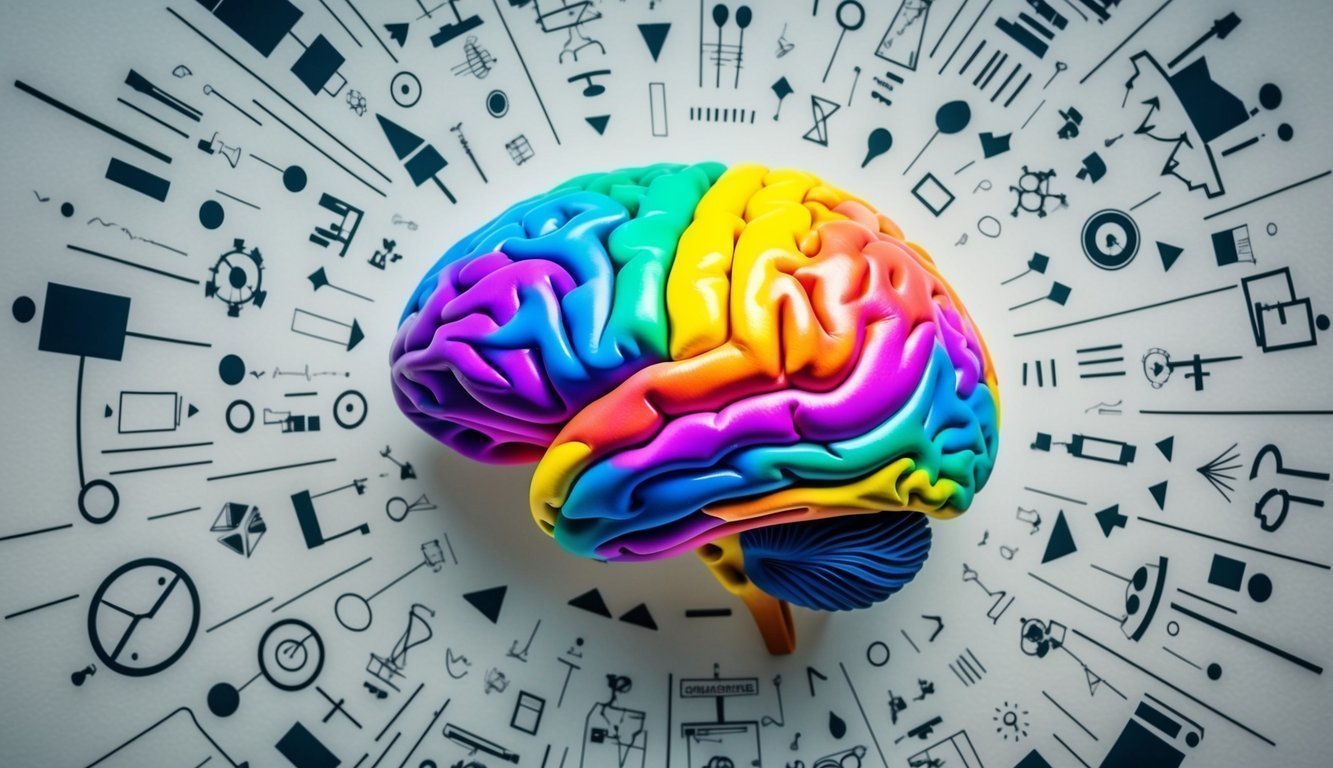PsychNewsDaily Publishers
100 Summit Drive
Burlington, MA, 01803
Telephone: (320) 349-2484
PsychNewsDaily Publishers
100 Summit Drive
Burlington, MA, 01803
Telephone: (320) 349-2484

Misunderstandings about psychology can obstruct our comprehension of human thought and behavior. Numerous widely held beliefs about the mind are either scientifically unfounded or offer overly simplistic views of intricate issues.
The prevalent belief that individuals are either “left-brained” (logical) or “right-brained” (creative) is a notable psychological misconception. In truth, both hemispheres collaborate for most cognitive functions.
Neuroimaging research indicates that intricate cognitive tasks engage various regions in both hemispheres. Language, typically linked with the left hemisphere, actually utilizes areas from both sides.
Creativity, often credited to the right hemisphere, depends on networks encompassing the whole brain. Problem-solving and analytical reasoning also involve bilateral engagement of multiple brain regions.
Although certain functions may be lateralized, the concept of hemispheric dominance shaping personality or capabilities is an oversimplification. The brain functions as a cohesive entity, with ongoing communication between its hemispheres.
The popular chemical imbalance theory regarding mental disorders, especially depression, has gained widespread acceptance. However, this reductionist view lacks robust scientific backing.
Mental health issues are intricate and multifaceted. While neurotransmitters play a role, they are not the only factors contributing to conditions like depression or anxiety.
Various elements, including genetics, life experiences, and environmental stressors, significantly affect mental health. The brain’s neuroplasticity and capacity to develop new neural pathways also play critical roles in psychological health.
Treatment strategies ought to acknowledge this complexity. Medication can be beneficial, but it is often most effective when paired with psychotherapy and lifestyle modifications.
The belief that birth order significantly influences personality traits is a common, yet largely unsupported psychological notion.
Large-scale research has shown negligible connections between birth order and personality traits. Family dynamics, parenting styles, and personal experiences play considerably more substantial roles in shaping individuality.
Generalizations linked to birth order (for example, firstborns being ambitious, and middle children acting as peacemakers) often arise from confirmation bias. People are prone to notice instances that reinforce their beliefs while ignoring contradictory data.
The relationships among siblings and family contexts are complex and diverse. Reducing personality traits solely to birth order overlooks the nuances of human development and individual distinctions.

Psychological research has unveiled many insights into human cognition and behavior. However, numerous significant studies and theories have been misrepresented or oversimplified in societal conversation. Such misconceptions can shape public perceptions of psychology and its practical relevance.
The Stanford Prison Experiment is frequently referenced as an example of how social roles can profoundly affect behavior. Nonetheless, more recent assessments have uncovered considerable flaws in the study’s design and interpretation.
Researchers have pointed out discrepancies in participant selection, the influence of the experimenter, and the broader applicability of the findings. The conclusions drawn from the experiment may reflect more about the specific environment established by the researchers than about general human behavior.
Critics contend that the study’s dramatic outcomes were influenced by demand characteristics and explicit instructions given to participants. This indicates that the findings may not be as relevant to real-world circumstances as previously assumed.
Sigmund Freud‘s theories have greatly influenced both popular culture and the domain of psychology. Nevertheless, many of his ideas lack empirical support and have been largely set aside by current psychologists.
While the idea of the unconscious mind remains pertinent, Freud’s specific constructs, such as the Oedipus complex and psychosexual stages, are not commonly endorsed in modern psychological practice.
Advancements in neuroscience and cognitive psychology have introduced alternative explanations for many of the phenomena Freud sought to clarify. Although his contributions to talk therapy are acknowledged, contemporary views regard his theories as historical references rather than credible scientific frameworks.
The notion that individuals possess distinct learning styles (visual, auditory, kinesthetic, etc.) has become widely accepted in educational environments. However, research does not substantiate the effectiveness of customizing teaching to individual learning preferences.
Studies indicate that while people may favor particular ways of absorbing information, such preferences do not align with enhanced learning outcomes when matched with corresponding teaching methods.
The persistence of the learning styles myth underscores the necessity for critical assessment of psychological principles, especially in educational contexts. Educators should prioritize evidence-based instructional strategies over catering to presumed learning styles.

Mental health disorders are complex conditions that demand an evidence-based perspective for accurate understanding and treatment. Misbeliefs about these disorders and their therapies can compromise effective care and outcomes for patients.
Schizophrenia and bipolar disorder are severe mental health conditions impacting millions globally. Contrary to common beliefs, these disorders are not merely extreme mood swings or fragmented personalities.
Schizophrenia encompasses a variety of symptoms, including hallucinations, delusions, and disorganized thought processes. It is a chronic condition necessitating long-term management, not a byproduct of inadequate parenting or individual shortcomings.
Bipolar disorder features alternating episodes of mania and depression. It transcends mere “moodiness”—these episodes can critically disrupt daily life and relationships.
Both conditions are treatable with appropriate medical intervention, including medication and psychotherapy. Early diagnosis and timely intervention can greatly enhance outcomes for those living with these disorders.
Psychotherapy, often referred to as talk therapy, is a demonstrably effective treatment for numerous mental health conditions. It extends beyond merely “discussing feelings” to encompass structured methods for addressing psychological challenges.
Prevalent forms of psychotherapy include:
These therapeutic approaches can assist patients in developing coping mechanisms, transforming negative thought patterns, and enhancing their relationships. Psychotherapy often yields the best results when supplemented with medication for specific conditions.
Counter to popular belief, pursuing therapy is not indicative of weakness. Rather, it signifies a proactive step towards improved mental health and personal development.
Hypnosis in psychological practice is frequently misrepresented due to its portrayal in movies and television. In clinical environments, it serves as a legitimate therapeutic method for various conditions.
Hypnotherapy has shown effectiveness for:
It does not involve mind control or an absence of free will. Patients retain awareness and control during hypnotherapy sessions.
While hypnosis can offer benefits, it is not a panacea. Its effectiveness can vary among individuals and conditions. Hypnotherapy should be administered by certified professionals as part of a comprehensive treatment plan.

Personality traits and creativity are fundamental to psychological study and application. These interconnected concepts offer insights into human behaviors, thought processes, and individual differences.
Misbeliefs regarding personality traits are widespread in popular culture. A common notion is that personality remains static and immutable. In reality, personality traits can change over time and in various contexts.
Another widespread myth posits that personality assessments can accurately forecast behavior. While these tests can provide meaningful insights, they do have limitations and should not be regarded as definitive predictors.
Furthermore, some erroneously consider certain traits to be inherently positive or negative. In actuality, the impact of traits is contingent on the specific context and setting.
Psychology students frequently confront these misconceptions during their training. Employing critical thinking and evidence-based methodologies aids in dispelling these myths.
Creativity is often misconstrued within psychology. Many individuals perceive it as an inherent trait reserved for a select few. However, research indicates that creativity can be nurtured and enhanced through practice and experience.
The belief that creativity is exclusively tied to artistic endeavors is flawed. It also pertains to problem-solving, innovation, and other fields outside the arts.
Additionally, some mistakenly think creativity thrives only in unconstrained environments. In truth, moderate constraints can sometimes enhance creative thought.
Psychology as a discipline investigates the cognitive mechanisms behind creativity, the role of environmental factors, and its connections to personality traits. This research informs educational and professional practices aimed at fostering innovation and creative problem-solving abilities.

Numerous myths surround psychology education and career opportunities. These fallacies can misguide students and prospective professionals, creating distorted expectations regarding the field.
Pursuing psychology often exposes students to prevalent myths. One common fallacy is that a psychology degree guarantees a career as a therapist. In reality, the psychology field encompasses a wide range of career paths beyond therapeutic practices.
Another misunderstanding is that psychology classes are primarily centered around analyzing individuals’ behaviors and thoughts. While this element is part of the curriculum, psychology as a discipline also focuses heavily on rigorous methodologies and statistical evaluations.
Additionally, students may believe that their personal experiences suffice for grasping psychological concepts. However, psychological research relies on empirical data and scientific methods for drawing valid conclusions.
Careers in psychology often diverge from common perceptions. Many assume that all psychologists operate in clinical settings, but the field features a variety of professional avenues in research, academia, business, and beyond.
Psychological research is fundamental to the profession. Despite the misconception that psychologists primarily provide talk therapy, psychologists routinely conduct research, analyze findings, and enhance scientific understanding.
Job opportunities in psychology can be competitive, especially for roles requiring advanced education. Individuals aspiring to enter the field should recognize that establishing a successful career may require time and further education beyond a bachelor’s degree.